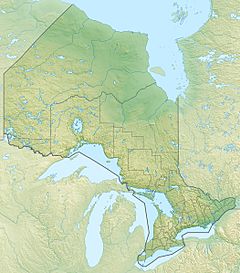Lomond River (Ontario) facts for kids
Quick facts for kids Lomond River |
|
|---|---|
|
Location of the mouth of the Lomond River in Ontario
|
|
| Country | Canada |
| Province | Ontario |
| Region | Northwestern Ontario |
| District | Thunder Bay |
| Physical characteristics | |
| Main source | Loch Lomond 268 m (879 ft) 48°16′08″N 89°17′34″W / 48.26889°N 89.29278°W |
| River mouth | Lake Superior 183 m (600 ft) 48°15′59″N 89°15′24″W / 48.26639°N 89.25667°W |
| Length | 3.4 km (2.1 mi) |
| Basin features | |
| River system | Great Lakes Basin |
The Lomond River is a small but important river located in Ontario, Canada. It flows through the Fort William First Nation and the Municipality of Neebing. This river is a key part of a much larger water system called the Great Lakes Basin.
About the Lomond River
The Lomond River starts its journey from a lake called Loch Lomond. From there, it flows through a smaller lake before finally reaching Lake Superior. Lake Superior is one of the largest freshwater lakes in the world!
Where is it?
The Lomond River is found in Northwestern Ontario, specifically within the Thunder Bay District. This area is known for its beautiful natural landscapes and many lakes and rivers. The river passes through lands belonging to the Fort William First Nation and the Municipality of Neebing.
How long is it?
The Lomond River is about 3.4 kilometers (or 2.1 miles) long. It starts at an elevation of 268 meters (879 feet) above sea level at Loch Lomond. By the time it reaches Lake Superior, its elevation drops to 183 meters (600 feet). This difference in height means the river flows downhill, carrying water from the smaller lake to the much larger one.
Part of a Bigger System
The Lomond River is an important part of the Great Lakes Basin. A basin is like a giant bowl where all the rain and melted snow eventually drain into a specific body of water. In this case, all the water in the Great Lakes Basin eventually flows into the Great Lakes. The Lomond River helps carry water from its source lake into Lake Superior, which is the first of the Great Lakes in this chain. This connection helps keep the entire Great Lakes system healthy and full of water.
 | Chris Smalls |
 | Fred Hampton |
 | Ralph Abernathy |


